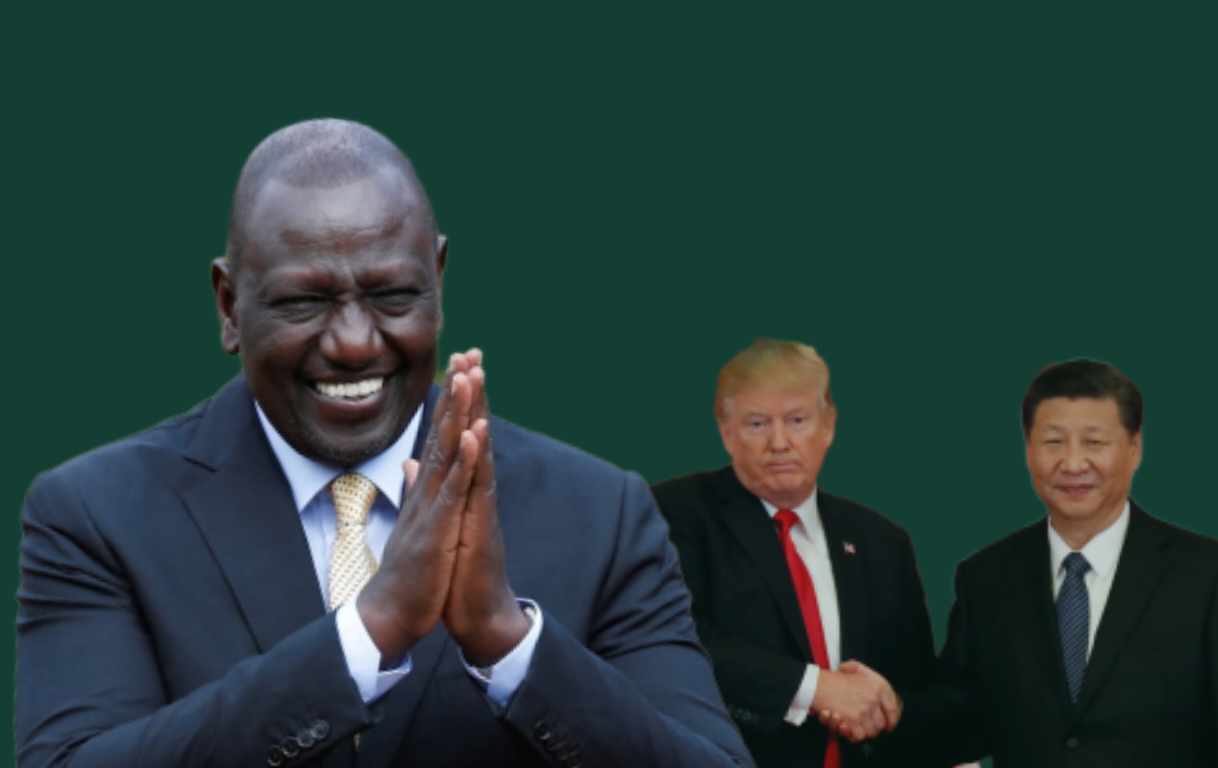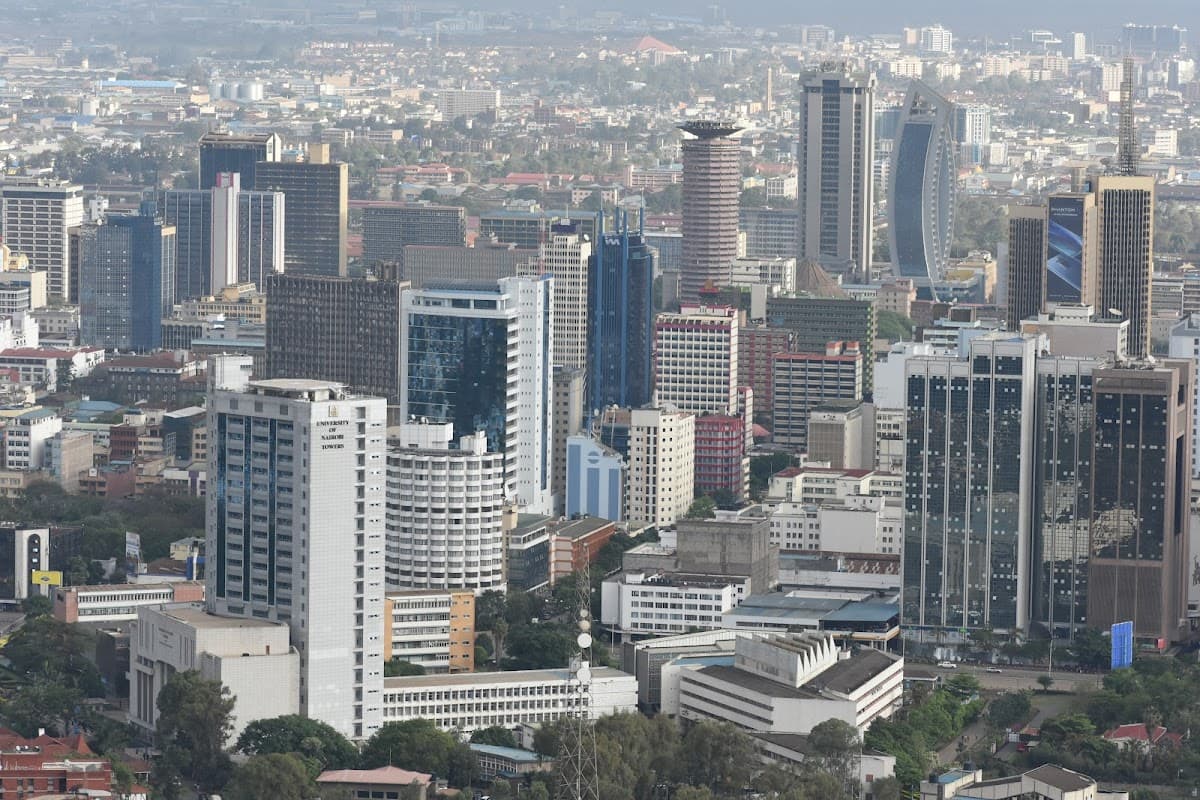KENYAN President William Ruto’s visit to China has resulted in significant financial commitments across multiple sectors, reinforcing Kenya's strategic partnership with her Asian Counterpart. However, balancing relations with China and the West will be crucial for the future.
The visit that marks the strengthening of strategic and economic ties between the two countries, at a time when both Beijing and Nairobi are trying to review their alliances in the face of the threat of a trade war unleashed by the president of the United States, Donald Trump.
Speaking in Beijing, the Kenyan President said Nairobi is better positioned to serve as the mediator between the United States and China in the wake of a simmering trade war, that has seen Chinese President Xi Jinping raise tariffs on US goods to 125% after U.S President Donald Trump raised tariffs on China to 145%.
Ruto, likened his visit to Washington last year to his recent Beijing's trip, explaining that the State visits might mean that Kenya can serve as the link between East and West amid the ongoing tension.
“This visit as the first African state visit to China this year mirrors my 2024 visit to the US The first African state visit in 15 years. Perhaps, symbolically, Kenya can serve as a bridge between East and West, North and South in an era of deepening geopolitical tensions." Ruto said.
Meanwhile, the Chinese President and his Kenyan Counterpart, reiterated their willingness to maintain close exchanges, consolidate cooperation at all levels, “firmly support each other” on issues affecting their respective interests and “resolutely oppose external interference and pressure”, and agreed to strengthen cooperation in various areas – infrastructure, trade, digitalisation, health, education, finance and green economy – and to encourage further alignment of China’s Belt and Road Initiative (BRI) with Kenya’s Vision 2030.
Chinese President Xi Jinping said China stands ready to work with Kenya to further develop Beijing's relations with the continent and strengthen solidarity and cooperation in the Global South.
“China and Kenya should continue to firmly support each other in safeguarding national sovereignty, security and development interests, firmly support each other in exploring development paths suited to their national conditions, deepen exchanges of experience in state governance, and become traveling companions and true friends on the road of modernization,” Xi said.
In addition to opening up for increased imports of high-quality Kenyan products, China aims to work with Nairobi to maintain regular political communication, promote connectivity and sustainable trade, explore diversified financial flows and contribute to the strengthening of the Belt and Road Initiative.
China, Xi added, “does not cause trouble, but is not afraid of it” and is ready to work with other countries to respond to issues on the international scene.
Referring to US President Donald Trump's tariff policy, Xi said that “there are no winners in trade and tariff wars,” and stressed Beijing's willingness to “work with other countries in the world to respond to various issues through unity and cooperation, safeguarding their legitimate rights and interests, international trade rules and international fairness and justice.”
Meanwhile, Ruto said he believed the ongoing US-China trade war could spell the long-overdue end of the old world order. He added that a new world trading system would have to take into account the current realities of an unjust global economic structure led by Western powers, in which underdeveloped nations, including African nations, are disadvantaged.
“The financial and security architecture that emerged from the ashes of that conflict has largely benefited the Global North at the expense of the Global South, to the exclusion of all others,” lamented Ruto, who attended a roundtable of investors from Kenya and China, where seven deals were signed with Chinese companies to invest in new development projects in East Africa’s largest economy.
The Kenyan leader also urged both Nairobi and Beijing to step up their campaign to promote the cause of the Global South on the international stage, insisting on reforming global institutions “to make them more representative and effective”. Ruto then described Chinese companies as the driving force behind Kenya’s economic growth over the years through investments.
Among the agreements signed in the presence of the two leaders, noteworthy are the Memorandum of Understanding on Blue Economy, Fisheries and Maritime Affairs, which aligns Kenya with the World Trade Organization (WTO) Agreement on Fisheries Subsidies, and the Memorandum of Understanding on Scientific and Technological Cooperation to promote partnerships in research, innovation and technological advances.
However, the focus of cooperation between Beijing and Nairobi is the infrastructure sector, with Kenya set to benefit from key projects under the Belt and Road Initiative (BRI).
These include the extension of phases 2B and 2C of the Standard Gauge Railway (SGR), the doubling of the Rironi-Mau Summit Highway and 15 rural roads financed by the China Development Bank (CDB).
Also included are funding for the doubling of the Northern Bypass, the doubling of Kiambu Road at the Northern Bypass, the construction of the Nithi Bridge, funding for the Intelligent Traffic Management System (ITMS) and the widening of Eldoret city roads.
In addition, an agreement on railway laws, infrastructure, operating standards and multimodal transport lays the foundation for a modern railway network connecting people and markets across the region.
A framework agreement is also included for the Nairobi Intelligent Transport System Phase III and for the improvement of city intersections, to help reduce traffic congestion and improve urban mobility.
Also of note are agreements in the areas of health, water, vocational education, cultural cooperation, news exchange and dissemination, training, e-commerce, sustainable production, agri-food, environmental sustainability, cyberspace, artificial intelligence, immigration and visa procedures and prevention of human trafficking.
This is President Ruto’s third trip to China since taking office in September 2022, but it is his first ever state visit to Beijing.
The Kenyan leader previously attended the Third Silk Road Forum in October 2023 and the Forum on China-Africa Cooperation in September 2024.
Ruto’s visit comes in the wake of US President Donald Trump’s 10 per cent tariff on all Kenyan exports to the US, which has accelerated Kenya’s attempt to diversify its trading partners.
Kenya is a key country in the BRI, an ambitious plan to connect Africa, Asia and Europe through massive infrastructure and energy projects. China has already funded billions of dollars in the construction of roads, ports and a Kenyan railway linking the coastal city of Mombasa to the capital Nairobi.
China and Kenya have significantly expanded cooperation in a variety of fields since establishing diplomatic relations more than six decades ago. In 2017, their ties became a strategic partnership of comprehensive cooperation.
Today, China is Kenya's largest trading partner and the main source of its imports, while Kenya is China's largest trading partner in East Africa.
At the beginning of his presidency, Ruto had prioritized ties with the West, and in particular with the United States, over China, being received at the White House in May 2024 by the then President Joe Biden, who on that occasion announced the granting of Kenya the status of “primary non-NATO ally”, assigned to countries that have privileged military cooperation with the US, even if they do not participate in alliances such as NATO.
However, after Donald Trump took office, US tariffs and the reduction of US aid pushed Nairobi to seek new markets and investments from Beijing.
China is of key interest, with Beijing currently topping the list. According to the General Administration of Customs (GAC) in Beijing, trade in goods between the two countries increased 11,9 percent year-on-year in the first three months of the year to 16,13 billion yuan (about 2,24 billion U.S. dollars), marking the sixth consecutive quarter of growth.
Chinese exports to Kenya saw a year-on-year increase of 11,8 percent in the same period, while imports from Kenya increased 13,2 percent.







